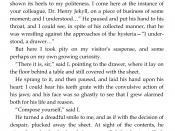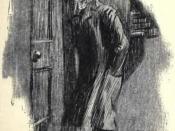A cruel reality of the world is that life is not fair. Bad people are often punished for their crimes, but they are punished after they have caused so much pain and anguish to their victims. A crime is not a crime if it hasn't yet taken place, hence a punishment cannot be given to someone who has not done anything wrong. It is impossible to know who is going to commit what crime and when they are going to commit them. The criminals are punished only after they have destroyed their victims' reality and sense of comfort. In The Strange Case of Dr. Jekyll and Mr. Hyde by Robert Louis Stevenson and The Island of Dr. Moreau by H.G. Wells, both authors write how life isn't fair and how bad people, who eventually pay for their crimes, are punished only after their victims have felt their wrath.
Mr. Hyde and Dr. Moreau are perfect examples of how evil is not punished until it is too late.
Mr. Hyde is as evil as anyone and his actions are both destructive and cruel. The murder of Carew, which was described ever so clearly by the maid who stated "Mr. Hyde broke out of all bounds and clubbed him to the earth. And next moment, with ape-like fury, he was trampling his victim under foot and hailing down a storm of blows, under which the bones were audibly shattered and the body jumped upon the roadway," is a crime which could not have been foreseen or stopped. No matter what punishment is given to Mr. Hyde, the life of Carew cannot be restored. What makes the crime even worse is that Mr. Hyde believes himself to be above punishment as indicated in his statement "let me but escape into my laboratory door,


